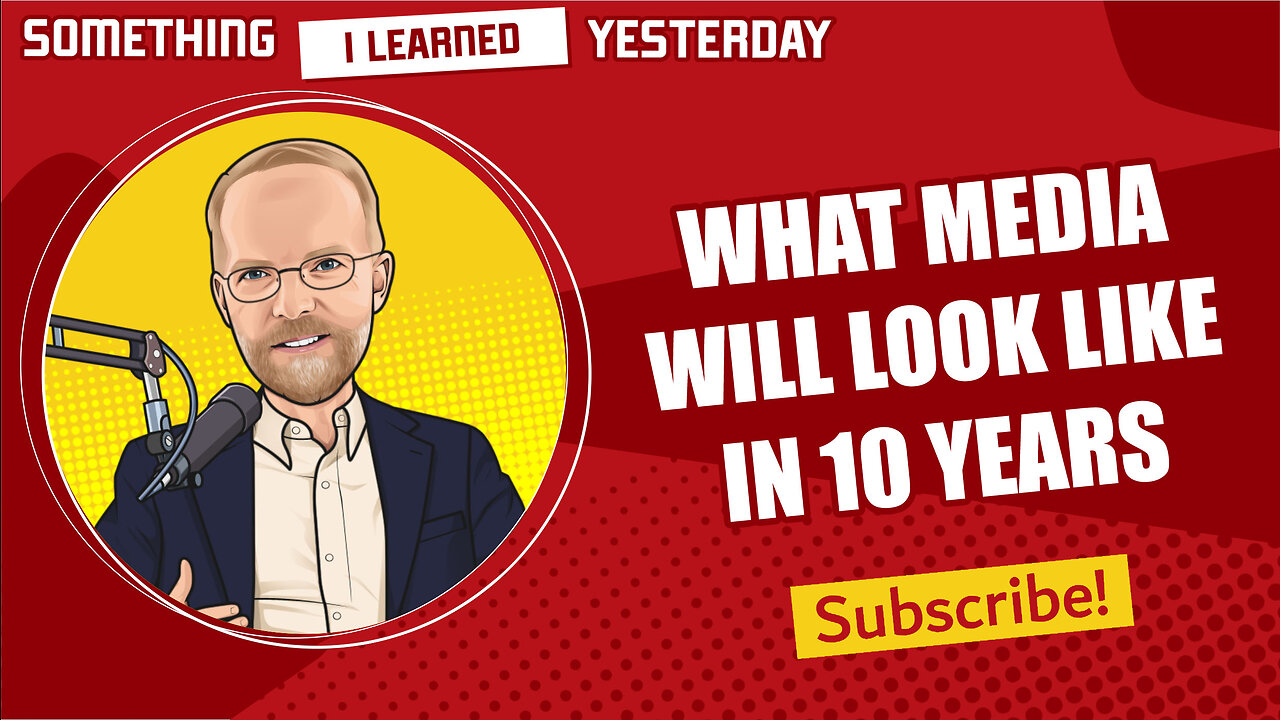Premium Only Content

136: The shape of media and information in 10 years
I was peering into my crystal ball to discover what content creation, discovery, and consumption will look like in 10 years. Here’s what I saw.
First, we have to think of content in a few different buckets. Or, to put it another way, why do people seek out information? Generally speaking, they have one of these goals.
Update Me
Educate Me
Give me perspective
Divert Me
Keep me on trend
Inspire me
All of those things will be done by AI. Everyone will have a 24-7 personal assistant plugged into their ear and their eye, and when they need something, they’ll just ask.
The vast majority of the public’s interaction with information will be through AI. People will still read books and magazines, but the books will be customized to the individual.
For example, when my grandson picks up Sherlock Holmes, his version will be annotated to explain dog carts, Lascar sailors, calabash pipes, and coal shuttles. That is, all those things I didn’t understand when I was reading the books. He might want an illustration on every page. His book will be different than mine – customized to him.
The role of human creators will be greatly diminished. Great minds will continue to contribute to the body of knowledge, but there won’t be any need for the average editor, writer, reporter, commentator, blogger, designer, singer, or speaker. AI will manage all of that.
But the AI will be monitored. Scholars will conduct daily classes to train and fine-tune AI.
Speaking of classes, there won’t be many teachers. Students will learn from AI, and the AI will learn from its interaction with humans, with other AI, and from the scholars.
There won’t be any such thing as a publishing company. If you want a leather-bound edition of Lewis’ Space Trilogy, with art in the style of Bruce Pennington, AI will figure that out and send it to a print-on-demand facility. Manned by robots, of course.
Same if you want a guide to what to plant in your vegetable garden. It’ll be customized to you.
All this generative AI will be monetized with ads, and by providing business intelligence to the few corporations that still need to exist. Like the print-on-demand vendor.
Scholars will train the AI – to make sure it doesn’t get any weird ideas – but the scholars won’t have the final say. Politicians will. If some position, or point of view, or perspective, is required to be believed, the AI will adjust everything to make sure you get that point of view.
And it will report you if you seem to kick against the pricks.
Oh, by the way. People will still have jobs. In 10 years we will have recovered from the disastrous attempts at “universal basic income,” where 90 percent of the population was addicted to drugs and porn.
That wasn’t sustainable, so the AI figured a way make people think they were doing something important. But none of that was in publishing, unless you were one of those scholars who spent all day debating with AI bots.
-
 1:28:38
1:28:38
Redacted News
2 hours agoEUROPE'S BLACKOUT CRISIS "Nothing works!" & Israel's Silent War vs Iran just got worse | Redacted
66.9K36 -
 1:07:19
1:07:19
Candace Show Podcast
2 hours agoFarewell Show: LIVE With Ian Carroll | Candace Ep 183
28.5K32 -
 33:37
33:37
Kimberly Guilfoyle
5 hours agoThe First 100 Days: Interview with Bienvenido President Abraham Enriquez | Ep217
31.5K6 -
 42:58
42:58
Stephen Gardner
1 hour ago🔥BOOM! Trump's NEW EO just changed EVERYTHING!!
9.15K10 -
 LIVE
LIVE
Dr Disrespect
6 hours ago🔴LIVE - DR DISRESPECT - TRIPLE THREAT CHALLENGE - WZ, PUBG, FORTNITE
3,656 watching -
 2:12:54
2:12:54
The Quartering
5 hours agoAdam Schiff IN TROUBLE, Woke Lefties MELTDOWN Over Temu, Karmelo Anthony Family LIES, & Much More
119K37 -
 1:12:00
1:12:00
RiftTV/Slightly Offensive
3 hours ago $4.99 earnedWho KILLED Virginia Giuffre? Only 11% of Black Chicago Students Can READ? | The Rift Report
35.2K21 -
 1:15:01
1:15:01
The HotSeat
2 hours agoDeporting Illegals, Arresting Judges, and Saving Women's Sports — More, Please!
21.3K5 -
 25:18
25:18
Scary Mysteries
4 hours agoSTRANGE & SCARY Mysteries Of The Month - April 2025
20.9K5 -
 1:35:24
1:35:24
Russell Brand
5 hours agoEpstein’s Most Famous Accuser Found DEAD—Was She Silenced? – SF573
160K36